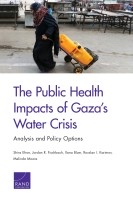| 来源类型 | Research Reports
|
| 规范类型 | 报告
|
| DOI | https://doi.org/10.7249/RR2515
|
| ISBN | 9781977401632
|
| 来源ID | RR-2515-RC
|
| The Public Health Impacts of Gaza's Water Crisis: Analysis and Policy Options |
| Shira Efron; Jordan R. Fischbach; Ilana Blum; Rouslan I. Karimov; Melinda Moore
|
| 发表日期 | 2018
|
| 出版年 | 2018
|
| 页码 | 108
|
| 语种 | 英语
|
| 结论 |
Gaza's young and growing population lacks water not only for drinking but also for hygiene and sanitation- More than a quarter of all reported disease in Gaza is caused by poor water quality and access.
- Chemical and biological contamination could lead to bacterial (cholera, Salmonella, Shigella), parasitic (Giardia), and viral (polio, viral meningitis) infections.
- If present trends continue, Gaza and the surrounding region are at risk of a disease outbreak or another water-related public health crisis.
Recent events have accelerated Gaza's longstanding water challenges- The main source of Gaza's water, its aquifer, is being depleted and its quality diminished by seawater intrusion, wastewater seepage, and agricultural runoff.
- Gaza's inconsistent energy supply greatly limits the operations of its water and wastewater treatment facilities.
- Recurring wars between Israel and Hamas have damaged Gaza's water infrastructure.
Gaza's water crisis could be resolved through greater investment in water and power infrastructure as well as additional water or electricity purchases, but many barriers remain- Israel and Egypt, Gaza's neighboring states, severely restrict access and movement of goods into Gaza, including materials needed for repairs and construction of electricity, water and wastewater infrastructure.
- Intra-Palestinian strife and a governance vacuum in Gaza have exacerbated externally inflicted damage in severely limiting the power supply and hindering reconstruction.
- International aid has been pledged inconsistently yet not followed through in full.
- Political complications hinder the implementation of all proposed solutions.
|
| 摘要 |
- Increase the quantity and consistency of Gaza's electricity supply through infrastructure and other investments such as advancing the "161kV Line;" upgrading and expanding the electricity transmission network to and inside Gaza; restoring the fuel storage tank at the Gaza Power Plant and connecting it to a natural gas pipeline; investing in solar energy; developing the Gaza Marine gas field; increasing the supply of purchased power from Egypt; ensuring consistent supply of electricity for the Khan Yunis Short-Term Low-Volume desalination plant; and improving fee collection to cover the ongoing cost of electricity.
- Increase Gaza's water supply and improve wastewater treatment, including by increasing water purchases from Israel; expanding desalination capacity; improving water storage and distribution systems; investing in household and industrial wastewater treatment; distributing chemicals and spare parts for household treatment systems; constructing more wastewater treatment plants; using treated wastewater to recharge the aquifer; repairing the wastewater collection system, and connecting all of Gaza residents.
- Protect public health and promote hygiene and sanitation practices by preventing and preparing for disease outbreaks (e.g., cholera vaccinations and rehydration salt packets); maintaining basic health services; promoting more-rigorous hygiene and sanitation education in schools; and creating a regional pandemic task force to prevent a disease outbreak and implement containment.
- Reduce implementation barriers and work within political differences through creating a follow-up mechanism on donor pledges; increasing funds for public health risk mitigation initiatives; relaxing restrictions on access and movement; and identifying trusted third parties to mediate political disputes over payments for water and electricity.
|
| 主题 | Egypt
; Gaza Strip
; Israel
; Public Health
; Water Resources Management
; Water Supply
|
| URL | https://www.rand.org/pubs/research_reports/RR2515.html
|
| 来源智库 | RAND Corporation (United States)
|
| 引用统计 |
|
| 资源类型 | 智库出版物
|
| 条目标识符 | http://119.78.100.153/handle/2XGU8XDN/108871
|
推荐引用方式
GB/T 7714 |
Shira Efron,Jordan R. Fischbach,Ilana Blum,et al. The Public Health Impacts of Gaza's Water Crisis: Analysis and Policy Options. 2018.
|
|
文件名:
|
x1539793034105.jpg
|
|
格式:
|
JPEG
|

|
文件名:
|
RAND_RR2515.pdf
|
|
格式:
|
Adobe PDF
|
除非特别说明,本系统中所有内容都受版权保护,并保留所有权利。